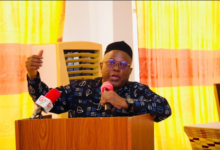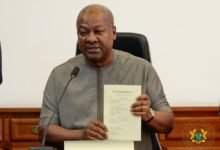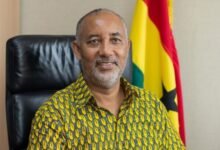Ghana marks 39th World Food Day
PThe 39th World Food Day was yesterday observed in Accra on the theme: “Our actions are our future, healthy diets for a zero hunger world”.
The occasion was also used to hoist the flags of the United Nations (UN) and Ghana.
The day was set aside by the UN to heighten public awareness on the problem of hunger in the world, promote the transfer of techniques to the developing world as well as strengthen international and national solidarity in the struggles against hunger, malnutrition and poverty in order to draw attention to the achievements in food and agricultural development.
The occasion attracted international partners, government officials, Metropolitan, Municipal and District Assemblies (MMDAs), religious bodies, traditional authorities, Civil Society Organisations (CSOs) and other stakeholders in the food and nutrition sector.
The Minister of State at the Ministry of Food and Agriculture, Dr Gyiele Nurah, on behalf of the sector minister, said this year’s celebration had brought to light important issues of nutrition as part of efforts to ensure zero hunger.
According to him, the recent Food and Agriculture Organisation (FAO) global report that, obesity had tripled since 1975, was a wake-up call for everyone to get on board to ensure that, “food is not about quantity but quality.”
“These statistics convey an impression that, while some are being overfed, others may be lacking the requisite food and nutritional needs”, adding that “the problem in Ghana is not about the unavailability of food, but mainly lifestyle choices and lack of knowledge about what constitutes nutritious food.”
Ghana, he explained, had made significant strides in reducing hunger, since the inception of the Planting for Food and Jobs campaign that “has seen a significant increase in staple food crops, resulting in massive food surpluses last year.”
The UN Ghana Resident Coordinator, Ms Sylvia Lopez, called for closer collaboration between the UN bodies, the civil society, the private sector, the media and the public, in order to eliminate hunger, saying “the cost of hunger is of the heaviest costs a society can pay as there are direct correlation between hunger, human development and by extension socio-economic development and transformation.”
The FAO Deputy Regional Representative and officer in charge of the Country Office, Ms Jocelyn Brown Hall, lamented the increasing malnutrition across all regions and income groups and called for action to make healthy and sustainable diets accessible and affordable to everyone.
The Deputy Minister of Fisheries and Aquaculture Development, Francis Ato Cudjoe, said the government would intensify the fight against illegal fishing, implement closed season strategies, promote aquaculture development and also provide training for fishermen on sustainable fishing practices.
The World Food Programme Representative and Country Director, Ms Rukia Yacoubi said the WFP had invested a lot into improving the lives of smallholder farmers, and commended the Kichtowale Women’s Group in Kiape in the Upper West Region for working assiduously to improve the welfare of their families.
BY LAWRENCE VOMAFA-AKPALU







